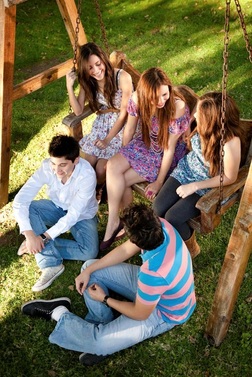Why We Exist

Over the past 50 years, people with intellectual disabilities have gained many rights that have improved their lives. Yet, our society is still far from inclusive. As one study noted, “Legal mandates cannot, however, mandate acceptance by peers, neighbors, fellow employees, employers or any of the other groups of individuals who directly impact the lives of people with disabilities.” (Teen Attitudes Toward Individuals with Mental Retardation, 2002) Parents and teachers of children with disabilities recognize the social isolation these children face, isolation that is well-documented by researchers. A report from 2001 noted, “Children with disabilities, particularly children with learning disabilities and mental retardation, are more vulnerable to feelings of loneliness than their peers without disabilities.” (Loneliness in Children with Disabilities; Pavri; 2001)
At the same time that researchers are proving the need children with disabilities have for more and better social contacts, they are also finding that interaction with peers with disabilities has positive impacts on those who do not have disabilities. “Teachers, parents, and children themselves report that children without disabilities benefit from their relationships with children with disabilities, (Peck, Donaldson, & Pezzoli, 1990; Staub, Schwartz, Gallucci, & Peck, 1994). Research suggests that children without disabilities are more accepting of children with disabilities when they have experience interacting with them (Biklen, Corrigan, & Guick, 1989).” (Friendships of Children with Disabilities, Education and Training in Mental Retardation and Developmental Disabilities, September 2002)
People who do not have a disability often take for granted the ease with which they make friends, and fail to recognize the enormous importance friendship plays in achieving success in school, the workplace, and the community. Researchers have found that social skills are essential to holding a job. In 1981, two researchers noted, “It is an inability to interact effectively with other people, rather than an inability to operate machines or perform job tasks that often causes many mentally retarded adults to get fired from competitive jobs.” (Greenspan and Shoultz, p. 23) Lack of social skills necessary to job success continues to this day..“ Actual ability to perform work tasks is just the tip of the iceberg in terms of success at work, with social and interpersonal skills underpinning the structure as much more significant predicators of workplace success.” (Small Talk at Work: Potential Problems for Workers with an Intellectual Disability, Janet Holmes, 2003)
A study in 2000 found, “Interpersonal workplace interaction provides many challenges for workers with intellectual disabilities. While these workers are generally able to handle well the tasks required of them at work, the social interaction which others manage with ease often presents unexpected hurdles to such workers.” (Holmes, J., & Fillar, R. (2000) International Journal of Disability, Development and Education, 47(3), 273-291.) Three years later, another study found, “Employment success for people with disabilities is closely related to the degree to which they are physically and socially integrated into the work environment.” Riches, V.C., & Green, V.A. (2003) Journal of Vocation Rehabilitation, 19(3), 127-142
Clearly, the opportunity to develop social skills as students is essential to success in adulthood for people with intellectual disabilities. Best Buddies provides the experience of having and being a friend from middle school on, thereby training children with intellectual disabilities in the skills necessary to succeed in the community and the workplace. As with any successful social movement, the key to change is changing people’s minds and hearts. By introducing one person with a disability to a peer who does not have a disability, Best Buddies meets the immediate needs for socialization and affects long-term change in people’s attitudes towards individual’s with intellectual disabilities.
Information Provided by BestBuddies.org
Photo Credit: Microsoft Clip Art
